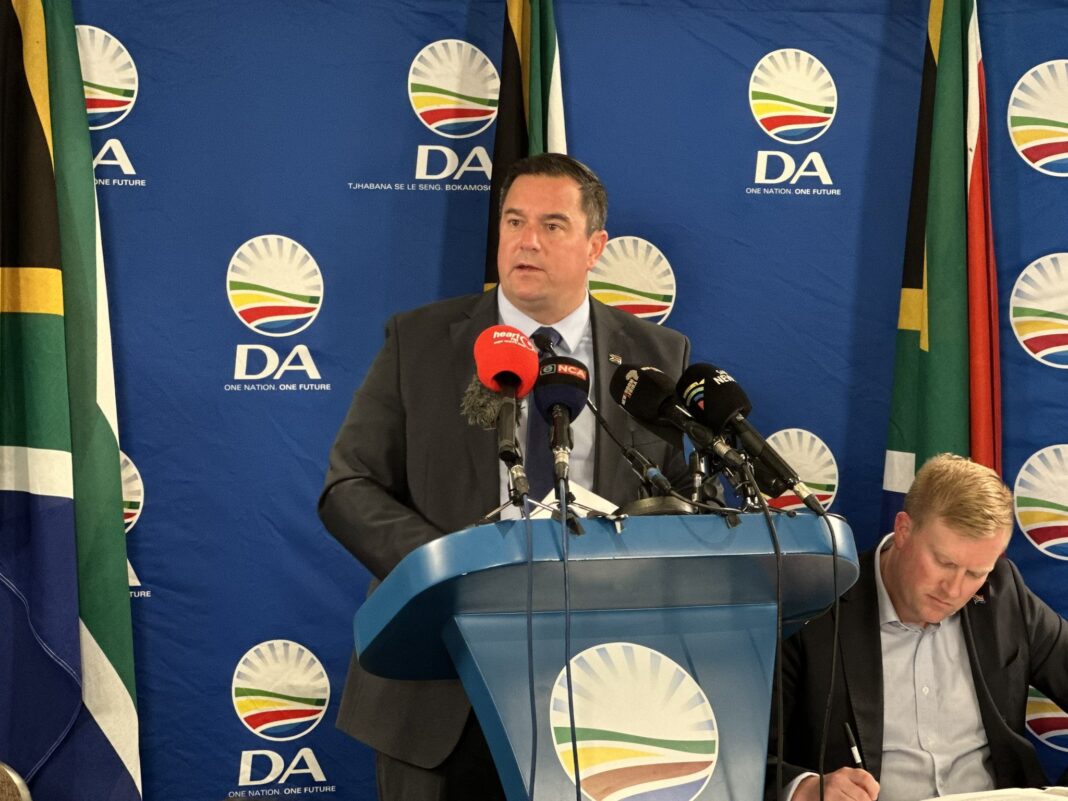By Johnathan Paoli
The Democratic Alliance has formally called for a “reset” of the Government of National Unity (GNU), citing growing tensions with the African National Congress over key policy decisions.
DA leader John Steenhuisen, joined by Public Works and Infrastructure Minister Dean Macpherson, highlighted the ANC’s alleged disregard for coalition agreements on the Expropriation Act and the National Health Insurance (NHI) Act.
“We are invoking clause 19 in pursuit of an urgent reset in relations, because South Africa deserves a functioning coalition, where partners treat each other with respect in pursuit of solutions to our country’s many pressing problems,” Steenhuisen said.
He accused the ANC of breaching the coalition’s foundational principles, as outlined in the Statement of Intent, following President Cyril Ramaphosa’s signing of the Expropriation Bill, despite Macpherson’s constitutional objections.
Steenhuisen criticised the ANC for failing to engage constructively on NHI, noting that a request for discussions was ignored.
He also condemned Health Minister Aaron Motsoaledi’s recent comments at the World Economic Forum, where he reportedly described opposition to NHI as a “war,” calling the remarks disrespectful and inflammatory.
Steenhuisen emphasised that the DA’s participation in the GNU is not to “make up the numbers” for ANC policy implementation but to ensure meaningful power sharing and reforms.
He warned that the ANC’s continued dominance mentality threatened the coalition’s stability.
To resolve the impasse, the DA has formally invoked Clause 19 of the coalition agreement, which outlines a process for addressing disputes and achieving consensus.
The party also plans to engage other GNU partners, including the Inkatha Freedom Party, which has also opposed the Expropriation Bill.
Steenhuisen stressed that the DA’s actions aimed to reset relations within the GNU and ensure effective governance.
He cautioned that failure to address these issues could force the DA to reconsider its position in the coalition.
Steenhuisen emphasised that the appeal to Ramaphosa was not an ultimatum, but a plea for mutual respect and genuine collaboration, stressing that the GNU was a partnership mandated by voters, requiring shared compromises to pass critical plans like the mid-term development strategy and budget.
Macpherson outlined his concerns about the newly assented Expropriation Act, revealing that in early December, he submitted a legal opinion from a leading public law expert to Ramaphosa, flagging fatal constitutional inconsistencies in the legislation.
He recommended that the Bill be referred back to Parliament under Section 79.1 of the Constitution. He received a letter from the president stating the legislation was constitutional and Ramaphosa bypassed consultation with the minister or his office in its signing into law.
Macpherson detailed the Bill’s key flaw: conflicting processes in Sections 7, 8, and 19 concerning compensation for expropriated property.
While Sections 7 and 8 require compensation to be determined before expropriation notices are issued, Section 19 allows court proceedings to finalise compensation after notices are served.
These contradictions render the Bill vague, irrational and unconstitutional.
He criticised the ANC for exploiting the Act to appeal to certain voter groups, labelling it a pretext for land grabs.
Macpherson reaffirmed the DA’s stance that private property rights were non-negotiable and pledged to ensure that unconstitutional laws were challenged.
Despite being excluded from key decisions, Macpherson stated that his office had plans to amend and rectify the Bill’s defects.
The DA confirmed legal action was underway to challenge the Act’s validity, with court papers being drafted.
Steenhuisen urged Ramaphosa to engage GNU partners constructively and cautioned against treating coalition members as subordinates.
He reaffirmed the party’s commitment to making evidence-based decisions and steering away from the ANC’s National Democratic Revolution agenda.
The Expropriation Act allows state organs to expropriate land in the public interest, while the NHI aims to introduce universal healthcare.
INSIDE POLITICS

